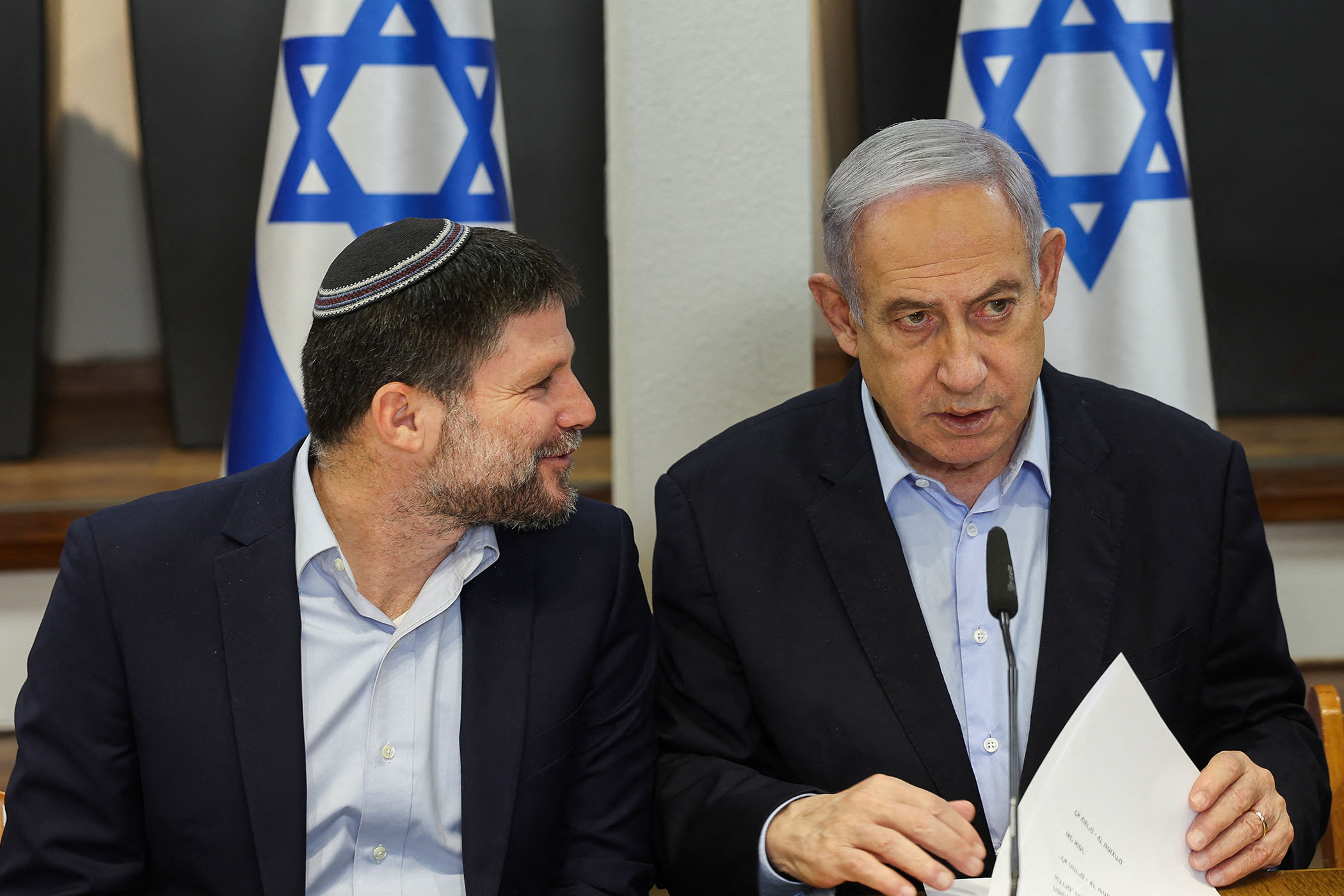For nearly two years, Israeli prime minister Benjamin Netanyahu has claimed that the country is fighting on seven fronts. Last week he opened an eighth by targeting Hamas negotiators in Qatar, drawing a fresh wave of international condemnation towards Israel.
But the most decisive front he is fighting on may be closer to home. Faced with increasing Israeli isolation on the world stage, Netanyahu is doubling down on his base.
“If you want to understand the strategy of the state of Israel, it’s all about the strategy that will keep Netanyahu in power for the longest time,” said Gideon Rahat, a professor of political science at the Hebrew University of Jerusalem. “It’s all about the political fate of Netanyahu.”
The prime minister is not the only member of Israel’s cabinet whose position is being driven by electoral politics. Two far-right ministers – finance minister Bezalel Smotrich and national security minister Itamar Ben-Gvir – are fighting for their political futures too. From rival parties, they are also competing with each other, fishing from the same pool of extremist voters.
Smotrich has proposed annexing the West Bank and occupying Gaza. Ben-Gvir wants Jewish Israelis resettled in the Palestinian enclave.
Elections are scheduled to be held by late October next year for the Israeli parliament’s 120 seats. If they were held today, polls show Netanyahu’s coalition would lose. Its share of seats in the Knesset has fallen to about 50 since Netanyahu secured a fifth term in office in 2022. Ben-Gvir and Smotrich are polling 11 seats together.
“On the face of it, their chances of being in a future coalition – unless Netanyahu wins by a landslide – are very low, to say the least,” said Roni Rimon, who managed Netanyahu’s election campaign in 2009.
Faced with corruption charges and sliding popularity, Netanyahu has relied on the support of ultra-orthodox religious parties and far-right ultranationalist parties to remain in power. But those parties’ agendas are widely unpopular and have alienated swathes of the Israeli public, including voters for Netanyahu’s Likud party.
Related articles:
While about two thirds of Israelis – including just over half of Likud voters – want the war to end, the far-right ultranationalist partners in Netanyahu’s coalition have repeatedly threatened to withdraw support for him if he strikes a deal with Hamas.
In return for the support of ultra-orthodox parties, Netanyahu has shielded the community from military service, provoking a backlash from the wider public who view it as unfair. Nearly two years into Israel’s longest war, the exemption of Haredim has increased the burden on the rest of the population to serve.
Newsletters
Choose the newsletters you want to receive
View more
For information about how The Observer protects your data, read our Privacy Policy
“If he continues the current strategy, he will strengthen the base more and more at the expense of the people who have left Likud,” said Rimon. “You don’t win elections on the shrunken base, which is his situation now.”
Faced with unfavourable odds, Netanyahu is playing for time. For as long as the war in Gaza continues, Israel is unlikely to hold an election that will be a reckoning for the failures that led to the 7 October attacks by Hamas. Losing the premiership could also force Netanyahu to fully face corruption charges that have dogged him in recent years.
‘He could create another Iran crisis to make sure there is no election. Nothing is beyond him’
‘He could create another Iran crisis to make sure there is no election. Nothing is beyond him’
Alon Pinkas, former Israeli diplomat
“One thing is for sure: he cannot afford to finish the war and [for it to be seen] that Hamas still exists as a political or institutional force in Gaza,” said former spokesman Aviv Bushinsky. “Netanyahu knows that the way to redeem himself as much as he can is by reaching unequivocal success in defeating terror”. While Israel’s offensive in Gaza is deeply divisive, the public has been much more united behind strikes on Yemen, Lebanon and Iran – and most recently Qatar.
Netanyahu’s biggest political vulnerability is the fate of the remaining 48 hostages held by Hamas, of whom 20 are thought to be alive. More than half of Israelis believe the government isn’t doing enough to get them back. Hostage relatives who have become the primary voice of opposition to Netanyahu condemned last week’s strike targeting Hamas negotiators in Gaza, saying it sabotaged any prospect of a deal for their release.
The support of his base enables Netanyahu to weather criticism, even from Trump, said former Israeli diplomat and prime ministerial adviser Alon Pinkas. But Netanyahu’s message of Israel against the world is unable to shield Israelis from their country’s increasing pariah status. A poll conducted by Pew research earlier this year found a majority of people overseas take a negative view of both Israel and Netanayhu.
Unable to sway their own leadership, hostage families and other opponents of Netanyahu’s policies have increasingly directed their appeals to the only person able to influence him. “He doesn’t give a damn about any other actor in the world except for Trump,” said Rahat.
The strike on Doha drew rare criticism from Trump, who was “not thrilled about the whole situation”. But beyond that, he has shown little interest in restraining Netanyahu, who has shown willingness to test his most powerful backer.
“There is a price: international isolation is not just a theory. It affects people,” said Pinkas.
Despite international criticism of Israel’s longest ever war and expanding attacks, Pinkas feared that Netanyahu might see these as tools to delay an election even further.
“There is no chance in the world that he [Netanyahu] can win the next election, but that’s not tomorrow,” he said. “He could create another Iran crisis to make sure there is no election. Nothing is beyond him. He’s completely unhinged. He’s a dangerous man.”
A recent poll by Israel’s Channel 13 showed an emerging party led by Netanyahu’s main challenger, ex-prime minister Naftali Bennett, edging ahead of Likud. Bennett has met former army chief-of-staff Gadi Eisenkot to discuss forming a leadership for next year’s elections and the deterioration of Israel’s international standing. Those hoping a change in leadership will bring a more moderate approach are likely to be disappointed. In an interview with Channel 4 last week, Bennett defended the Doha strike, saying nowhere was off limits. “You can no longer kill Jews and think you can get away with it, wherever you may be.”
Photo by Ronen Zvulun /AFP via Getty Images




